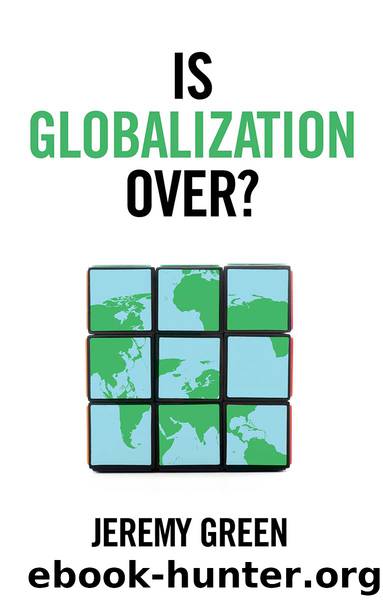Is Globalization Over? by Jeremy Green

Author:Jeremy Green
Language: eng
Format: epub
ISBN: 9781509535460
Publisher: Wiley
Published: 2019-11-25T00:00:00+00:00
Global fault lines
The intellectual vision championed by the disciples of the Mont Pelerin Society has had devastating effects. Stripped of its commitments to full employment, capital controls, and a generous cushion of welfare provision, the globalization project has steadily eroded popular support. The financial crisis represented the global instability brought about by a world of liberalized and enlarged global capital flows. But it also acted as a catalyst, energizing political responses to a deeper set of problems that have blighted contemporary capitalism. In doing so it fractured the political consensus around the neoliberal project. The measures used to try to deal with the consequences of the crisis, from fiscal austerity to loose monetary policy, have failed to quell rising political opposition. They have not been able to secure political legitimacy for contemporary capitalism. Domestically, governments throughout the world have struggled to maintain their grip on power within a context of weaker economic performance and political polarization. While internationally, the momentum towards further globalization has ebbed away as American leadership has been withdrawn.
How do we make sense of what is behind the crisis of globalization? We need to think about the interaction of two different types of problems that are shaping contemporary politics. The first type of problem is of a longer-term and more structural character. These are problems that emerge from the DNA of neoliberal globalization as a project. They include the changing geography of global inequality, both within and between countries, the uneven economic performance of different countries within the world market, declining levels of economic productivity and growth, and environmental devastation. There is a strong element of inevitability surrounding the emergence of these problems, given the particular way that globalization has been designed and implemented by political and business elites. Overcoming them means rethinking how we organize and govern globalization.
These problems have interacted with a second type of problem. Problems that are of a more contingent nature in terms of their relationship to the structural problems outlined above. These problems are less directly a product of neoliberal globalization. They were not an inevitable consequence of neoliberalism and might well have arisen without it. Their emergence alongside these deep structural problems is coincidental. They include issues like the refugee crisis that emerged from the civil war in Syria and the Islamophobia that has been generated by the War on Terror (long pre-dating the financial crisis). Although linked to the changes brought about by globalization, these problems cannot be reduced to a single dominant cause or viewed as internal to liberal visions of political economy.
It is the timing of the combination between these deep-rooted structural problems and more contingent dilemmas that has framed current political responses to the crisis and fuelled right-wing populism. The ascendancy of the right-wing response to the crisis of neoliberal globalization is not simply a consequence of the weakness of progressive forces. It is also a response to the coincidence of the legacy of the economic crisis (the austerity, diminished living standards, and general mood of
Download
This site does not store any files on its server. We only index and link to content provided by other sites. Please contact the content providers to delete copyright contents if any and email us, we'll remove relevant links or contents immediately.
The Secret History by Donna Tartt(16624)
The Social Justice Warrior Handbook by Lisa De Pasquale(11489)
Thirteen Reasons Why by Jay Asher(7788)
This Is How You Lose Her by Junot Diaz(5773)
Weapons of Math Destruction by Cathy O'Neil(5037)
Zero to One by Peter Thiel(4824)
The Myth of the Strong Leader by Archie Brown(4789)
Promise Me, Dad by Joe Biden(4447)
Beartown by Fredrik Backman(4419)
Stone's Rules by Roger Stone(4415)
How Democracies Die by Steven Levitsky & Daniel Ziblatt(4399)
The Fire Next Time by James Baldwin(4343)
100 Deadly Skills by Clint Emerson(4079)
A Higher Loyalty: Truth, Lies, and Leadership by James Comey(4033)
Rise and Kill First by Ronen Bergman(4012)
The David Icke Guide to the Global Conspiracy (and how to end it) by David Icke(3883)
The Farm by Tom Rob Smith(3872)
Secrecy World by Jake Bernstein(3782)
The Doomsday Machine by Daniel Ellsberg(3731)
